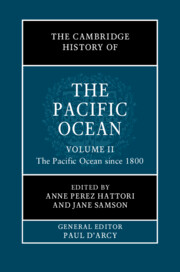Book contents
- The Cambridge History of the Pacific Ocean
- The Cambridge History of the Pacific Ocean
- The Cambridge History of the Pacific Ocean
- Copyright page
- Contents
- Figures
- Tables
- Contributors to Volume II
- Frontispiece
- General Editor’s Introduction
- Preface to Volume II
- Part VII Rethinking the Pacific
- Part VIII Approaches, Sources, and Subaltern Histories of the Modern Pacific
- Part IX Culture Contact and the Impact of Pre-colonial European Influences
- Part X The Colonial Era in the Pacific
- Part XI The Pacific Century?
- Part XII Pacific Futures
- 60 Ancestral Voices of the Sea
- 61 Defining the Contours of the Lagoon
- 62 New Pacific Voyages since Independence
- 63 Creating Sustainable Pacific Environments during the Anthropocene
- 64 Concluding Reflection
- References to Volume II
- Index
60 - Ancestral Voices of the Sea
Hearing the Past to Lead the Future
from Part XII - Pacific Futures
Published online by Cambridge University Press: 11 November 2022
- The Cambridge History of the Pacific Ocean
- The Cambridge History of the Pacific Ocean
- The Cambridge History of the Pacific Ocean
- Copyright page
- Contents
- Figures
- Tables
- Contributors to Volume II
- Frontispiece
- General Editor’s Introduction
- Preface to Volume II
- Part VII Rethinking the Pacific
- Part VIII Approaches, Sources, and Subaltern Histories of the Modern Pacific
- Part IX Culture Contact and the Impact of Pre-colonial European Influences
- Part X The Colonial Era in the Pacific
- Part XI The Pacific Century?
- Part XII Pacific Futures
- 60 Ancestral Voices of the Sea
- 61 Defining the Contours of the Lagoon
- 62 New Pacific Voyages since Independence
- 63 Creating Sustainable Pacific Environments during the Anthropocene
- 64 Concluding Reflection
- References to Volume II
- Index
Summary
The people of Moana Nui, Oceania, abound with historico-cultural accounts, in stories, songs, chants, incantations, poems, proverbs, dances, and symbols, about the ancestors who emerged and resided in the seascapes, landscapes, and skyscapes of the Indigenous world.1 These ocean-land-cosmic ancestors were not limited to humans; they were also natural beings and elements of the fonua, socio-ecology, namely stars, birds, fishes, reptiles, animals, plants, waters, soils, rocks, and mountains.2 They were relatives who were nurtured and venerated by all. At death, certain human ancestors were divinized and returned as avian life, marine life, floral, fauna, or other elements to care for and protect their descendants. In mutual dependence, the descendants safeguard and venerate their ancestors in all their multiplicity of forms. Consulting the ancestors and their wisdom in all matters relating to life and death was a common Indigenous practice in Moana Nui. This cultural practice was philosophically grounded on the Moana Nui arrangement of tā and vā, time and space.3 In Tongan, tā is an expression of time. It means to mark time with beats, rhythms, and actions. Vā, on the other hand, means space between time-markers, tā. It is relational space. Tā and vā, or time and space, are inseparable. Time is spatially constituted while space is temporally marked. For example, in Moana Nui cultures, the temporal past, present, and future are spatially located in front, middle, and back.4 ‘In historical ways, however, it logically follows that the past, which has stood the test of time-space, is placed in front of people in the present as guidance, and the unknown future is located in their back in the present, informed by past experiences, with the past and future permanently negotiated in the conflicting present.’5Ancestral knowledge and skills were placed in front as the guide for the present and future. This is one of the reasons ancestors, elders, grandparents, parents, and elder siblings are endowed with the roles of leaders in many Moana Nui societies. They are the repositories and custodians of knowledge and skills. Ancestors, however, are placed at the highest level as the holders of deep knowledge and refined skills. They are the libraries of Indigenous Moana Nui historical knowledge and information. Certain ancestors were deified due to their extraordinary knowledge and skills. In this chapter, I will discuss three of the significant deified ancestors of Moana Nui, namely, Tangaloa, Māui, and Hina. Furthermore, I will discuss these ancestors within the seminal works of Epeli Hauʻofa.
- Type
- Chapter
- Information
- The Cambridge History of the Pacific Ocean , pp. 707 - 728Publisher: Cambridge University PressPrint publication year: 2023
- 1
- Cited by



